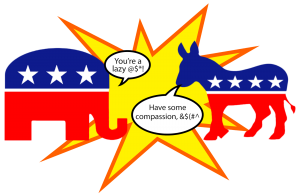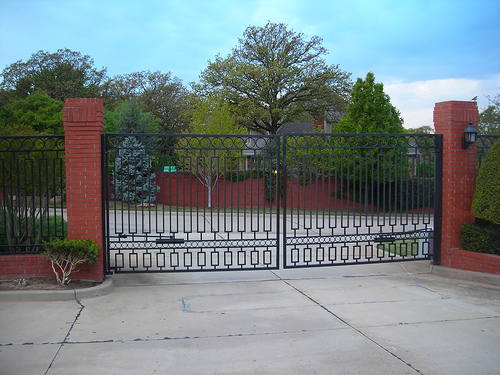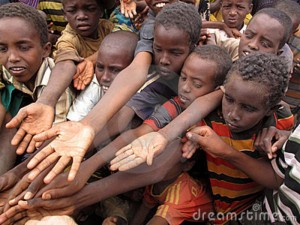Last post I discussed what we can learn from the Milgram experiments about obedience and authority, specifically about how authority can affect our moral decision making. I’m going to briefly summarize the experiment again, focusing on a few of the dozens of variations of the experiment. The “Experimenter” is the person running the experiment and giving commands to the “Teacher.” The “Teacher” is the actual subject of the study. The Teacher gives shocks of increasingly higher voltages to the “Learner” every time the Learner answers a question incorrectly. The Experimenter tells the Teacher when to do this. The Learner in the main experiment was in a different room and the Teacher could hear the screams of pain as the shocks reached higher and higher voltages. There were 20-40 different variants of this experiment. When Milgram set out to do this experiment, he assumed that maybe 1% of the subjects would shock the Learner to the point of unconsciousness, or death. In the baseline experiment (the famous one), 65% of people obey all the way to the point of the Learner’s unconsciousness/death. When the Teacher and Learner were in the same room (so they saw the person they were hurting) those who were ‘obedient all the way’ dropped to 40%. When the Teacher had to hold the Learner’s hand on the shock plate, those who were obedient all the way dropped to 30%.
I think there are some specific lessons we Mormons can learn from this. I’d like to focus on one of them, namely the importance of proximity to others. Simply seeing the learner suffering dropped the percentage of people willing to “obey all the way” from 65% of participants down to 40% and holding the Learner’s hand to the plate dropped it to 30%. Proximity increased the chances that the Teacher would assert their moral agency to stop the harm they were causing to others. While in the experiment this meant stopping the harm they caused despite pressure from the authority, I think it is analogous to us stopping the harm we cause despite the pressure from our own psychology and social norms.
Do we try to communicate with and understand those with whom we disagree?
 Human nature, or the natural man, is inclined to vilify those with whom we disagree. We are most likely to jump to an “us” vs. “them” mentality in which one group is the intelligent, caring, good group, and the other group is something less than human. We see this a lot in life, but perhaps especially when it comes to politics and religion. It requires a lot more effort to try and understand something from another’s point of view than to just assume they’re stupid or evil. It also requires that we actually interact with them.
Human nature, or the natural man, is inclined to vilify those with whom we disagree. We are most likely to jump to an “us” vs. “them” mentality in which one group is the intelligent, caring, good group, and the other group is something less than human. We see this a lot in life, but perhaps especially when it comes to politics and religion. It requires a lot more effort to try and understand something from another’s point of view than to just assume they’re stupid or evil. It also requires that we actually interact with them.
If you rarely communicate with people you ardently disagree with, it is easier to assume the worst about them. For example, let’s say that a group is striving to have their concerns heard by their leaders. The leaders don’t see things from that group’s point of view. Perhaps some might even assume that the group is making non-negotiable demands for things which some believe can’t possibly be accepted. Maybe some label them as extreme because of the worst assumptions about a subset of members of their group. However, if they had to hear them and speak with them face to face there is a much greater chance, statistically speaking, that they would feel some empathy for them. If they choose to avoid interacting with them and instead opt to only talk to groups that already agree with them and see things the same way, they are more likely to continue their indifference to other views and concerns. Proximity and interaction do something powerful. They force us to see how others are being affected, and perhaps see how our own actions and decisions can impact others for good or bad. This seems to be connected with the very concept of empathy. If we don’t see others, how can we fully empathize with them?
Do we see and interact with the poor and needy?
The 4th purpose of the church is to “care for the poor and needy.” When was the last time you had a ward or stake meeting focused on this purpose of the church? When was the last time you physically went to the homes of the poor and needy? I don’t mean the poor college student in your ward, or the family in your ward between jobs. I mean homeless, destitute people, especially those outside of our ward and church. When was the last time you actually had physical contact with them (a handshake, a hug, etc.)? The answers to those questions could be indicators of how likely you are to feel true empathy and concern for those less fortunate. I thought that this quote from Mormonism in Transition was interesting regarding how Mormons viewed community service.
As long as the society in which Mormons lived and the Latter-day Saint community were coextensive, members generally perceived service in the society as building the kingdom. Increasingly, however, the Latter-day Saints came to view their community as something apart from the larger society. Under these circumstances, some members became dubious about the legitimacy of accounting compassionate and social service outside wards and stakes as service in the Lord’s kingdom. Some, more concerned with personal morality than social service, believed welfare activities diluted religious experience.
Does this still apply to us today? I’m curious to know how much of our free time is taken up by service to our own Mormon community. Sunday is spent at church and, if your ward is anything like the last few wards I’ve lived in, Sundays are often also the days we have other meetings and when virtually all home and visiting teaching occurs. After work hours during the week, we have family home evening on Mondays. On either Tuesday or Wednesday, the youth have their activities at the church. Just with those basics, we’ve already taken up half of our free-time outside of work with activities related to our own Mormon community. This also left out many other meetings which happen on weeknights and weekends. We need to actively try to go engage more with the less fortunate who aren’t lucky enough to be involved in our community.
Fasting can go a long way to helping us gain empathy for the poor and needy, but it can’t do it all. I think Isaiah was pretty clear about this:
Wherefore have we fasted, say they, and thou seest not? wherefore have we afflicted our soul, and thou takest no knowledge? Behold, in the day of your fast ye find pleasure, and exact all your labors. (4) Behold, ye fast for strife and debate, and to smite with the fist of wickedness: ye shall not fast as ye do this day, to make your voice to be heard on high. (5) Is it such a fast that I have chosen? a day for a man to afflict his soul? is it to bow down his head as a bulrush, and to spread sackcloth and ashes under him? wilt thou call this a fast, and an acceptable day to the Lord? (6) Is not this the fast that I have chosen? to loose the bands of wickedness, to undo the heavy burdens, and to let the oppressed go free, and that ye break every yoke? (7) Is it not to deal thy bread to the hungry, and that thou bring the poor that are cast out to thy house? when thou seest the naked, that thou cover him; and that thou hide not thyself from thine own flesh?
The true purpose of fasting is not to make extra special prayers to get blessings we want (“we have afflicted our soul and been very hungry, so why haven’t you noticed God?”). The purpose of a fast is not “to make [our] voice to be heard on high.” It is very specifically an exercise in helping us have more empathy for and give more aid to the poor and needy. Not only that, but it gets at this whole empathy-through-proximity idea that we see in the Milgram experiments: “that thou hide not thyself from thine own flesh.” The poor and the needy are our siblings. They are our “own flesh.” Yet all to often we hide ourselves from them. Out of sight out of mind. Fasting forces us to feel the hunger that the poor and needy regularly experience. Hopefully feeling that hunger will give us more empathy for those who feel that involuntarily. Hopefully it will drive us to stop hiding ourselves from them.
Maybe we can say that fasting and giving fast offerings is like having the Teacher in the room with the Learner; if so, then how do we take the next step to make physical contact with the Learner? Do we think that fast offerings are sufficient to do our “duty” to the poor? Fast offerings are way, way down church-wide currently. Not only that, but even when they were doing better than today, fast offerings almost exclusively help our own church members and do nothing for the outside community. Do we really want to discount the poor who aren’t Mormons? The church has said that since 1985 it has spent $1.1 Billion on humanitarian aid. The average number of church members from 1985 until now was roughly 10 Million members (we’re now at over 14 Million). This means that on average (including all of our less-active members) we’ve spent an average of $4 per member per year on humanitarian aid. I’m not even going to mention several big ticket items the church and/or church owned businesses have spent money on during this time frame. Frankly, even if the church was spending vastly more to help the poor and needy globally, I think we as members would still need to get out into the community more among the poor and needy to fully gain the empathy necessary to sufficiently sacrifice for and serve them.
If you look at any maps that show the income levels of the population, it’s very clear that we geographically divide ourselves by $. Typically the more money we have, the more significantly we separate ourselves from the poor. The wealthy build gated communities to keep the poor away. If we can just avoid seeing them, it’s like they don’t exist. Then when we don’t have to interact with them, we can convince ourselves that they are just lazy and entitled. If we interacted with them more, it would become a lot more difficult to justify that mentality.
the Lord hath founded Zion, and the poor of his people shall trust in it. –Isaiah 14:32, 2nd Nephi 24:32
the Lord called his people Zion, because they were of one heart and one mind, and dwelt in righteousness; and there was no poor among them. –Moses 7:18
It might be easier and involve less effort to just continue on and avoid doing more to help the poor and needy, or to avoid striving for unity and to become one with those who disagree with us. It is easier, but I don’t believe that achieving Zion was ever supposed to be a simple task. Hugh Nibley also indicated that achieving Zion was not easy, and he laid out several ideas and methods for Approaching Zion. Our faith tenets explicitly state that we believe that we must literally establish Zion. I personally need to do a lot to improve in these areas. It is my hope and prayer that we reach out to others, especially those in need and those who think/believe differently than we. I hope that we will no longer hide ourselves from our own flesh and cease our current path of Avoiding Zion.
As a footnote, it was brought to my attention that some people seem to have internalized an idea that it is wrong to ever say “no” or “I can’t” to a request from the church for more service. If you are someone like this, be sure to not unnecessarily damage your health and close relationships in your efforts to better serve those in need.







I loved this Geoff. I can see how badly we need to improve as a culture, and how much more to go I have as a human.
Also, your picture captions win everything.
Great job Geoff! I loved this so much.
It’s sobering to think that until we “get in the room” with people who are hurting the majority of us will be willing to hurt them seriously if we believe authority is telling us to do something. If what authority tells us to do only causes pain indirectly, I suspect the numbers will be even worse. Until nearly all of us get in that room, the majority of us will be susceptible to causing pain, so we can’t use numbers to justify our moral position unless we can show that we are “holding hands” with those being hurt.
Excellent thoughts!
Here’s the dirty little secret about Avoiding Zion: The presence of poor people indicates you’re living in a Babylon society.
Asking the question “How can I better serve the poor?” is a good question. A better one would be, “How can we organize society so that no one is poor?”. The first question allows us to remain in Babylon with our conscience mollified, the latter opens the door to actually building Zion.
Government-enforced “income equality” is a Babylonian ruse – you can bet some will remain “more equal than others” no matter who or how it’s administered by bureaucrats and politicians. Pride-based societies always demonstrate inequality.
Voluntary equality is the hallmark of the economic side of Zion that we rarely discuss (our pride won’t let us go there). And this type of equality does not mean everyone has the same number of toys, it means everyone’s economic needs are equally valued by the group. In a Zion economy there are no poor because _we_ work together to fill _our_ mutual needs. In Babylon, _I_ compete with my neighbors to fill _my_ needs.
From the 1850s through the mid 1880s, the Saints under the direct leadership of the prophets and apostles, were working diligently to answer the Zion Economic Question – "How do we organize ourselves to fill our mutual needs?".
Let all in whose hearts the Spirit of Zion burns join together and start asking and answering this Zion-building question.
That was an amazing piece! It helps put a lot of things in perspective, as well as shifting my views on fasting and fast offerings. Wow! Excellent post!